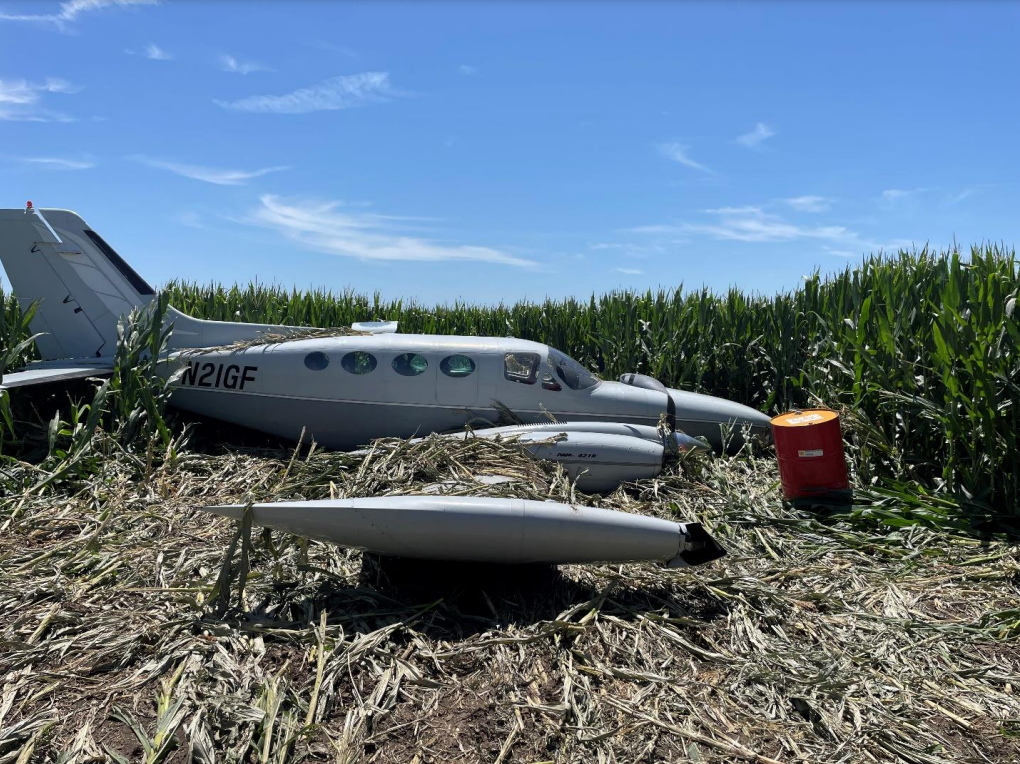
ASN Wikibase Occurrence # 280625
This information is added by users of ASN. Neither ASN nor the Flight Safety Foundation are responsible for the completeness or correctness of this information.
If you feel this information is incomplete or incorrect, you can submit corrected information.
| Date: | Saturday 16 July 2022 |
| Time: | 16:20 |
| Type: |  Cessna 421B Golden Eagle II |
| Owner/operator: | HawkFitz LLC |
| Registration: | N21GF |
| MSN: | 421B-0209 |
| Year of manufacture: | 1971 |
| Total airframe hrs: | 6207 hours |
| Engine model: | Continental GTSIO 520 |
| Fatalities: | Fatalities: 0 / Occupants: 5 |
| Aircraft damage: | Substantial |
| Category: | Accident |
| Location: | Onion Crest Airpark (43NE), Riverdale, NE -
 United States of America United States of America
|
| Phase: | Approach |
| Nature: | Private |
| Departure airport: | Goodland-Renner Field, KS (GLD/KGLD) |
| Onion Crest Airpark, NE (43NE) | |
| Investigating agency: | NTSB |
| Confidence Rating: |
On July 16, 2022, about 1620 central daylight time, a Cessna 421B airplane, N21GF, sustained substantial damage when it was involved in an accident near Riverdale, Nebraska. The two pilots and two passengers were uninjured and one passenger sustained minor injuries. The airplane was operated as a Title 14 Code of Federal Regulations Part 91 flight.
The pilot reported that he departed on the estimated 1-hour flight with about 110 gallons of fuel onboard. Upon reaching the destination airport, he elected to perform a go-around. During the go-around the left engine lost total power. The airplane descended into a corn field, resulting in substantial damage to both wings.
The second pilot on board reported that, while on final approach for landing, both engines sputtered at about the same time, “like fuel exhaustion.” He estimated the airplane’s total fuel consumption to be about 40 to 45 gallons per hour. He stated that he thought the airplane had about 80 gallons of fuel on board at the time of the accident.
A postaccident examination revealed that the fuel selector for the left engine was in the “LEFT MAIN” position and the selector for the right engine was in the “RIGHT MAIN” position. The left main fuel tank (located on the wingtip) separated from the airplane during the impact and was absent of fuel. The right main tank contained about 1 gallon of fuel, the right auxiliary tank contained about 5 gallons of fuel, and the left auxiliary tank and left nacelle tank were absent of fuel. After reconnecting the wiring, fuel quantity indicators were functionally checked with no anomalies noted.
During a postaccident engine examination, no mechanical malfunctions or anomalies were found that would have precluded normal operation. The total amount of fuel onboard the airplane before the flight could not be determined; however, given the lack of fuel found in the tanks after the accident and no indications of engine anomalies, it is likely that the loss of engine power was the result of fuel exhaustion.
Probable Cause: A total loss of engine power as a result of fuel exhaustion.
Accident investigation:
 |
|
Sources:
NTSB
https://data.ntsb.gov/Docket?ProjectID=105576
https://flightaware.com/live/flight/N21GF
https://photos-e1.flightcdn.com/photos/retriever/2b71fb58c9729deeff61441715c052a2af6d3a17 (photo)
Location
Images:

Revision history:
| Date/time | Contributor | Updates |
|---|---|---|
| 22-Jul-2022 07:52 | Captain Adam | Added |
| 12-Aug-2022 20:49 | Captain Adam | Updated [Time, Source, Narrative, Category] |
Corrections or additions? ... Edit this accident description
The Aviation Safety Network is an exclusive service provided by:


 ©2024 Flight Safety Foundation
©2024 Flight Safety Foundation